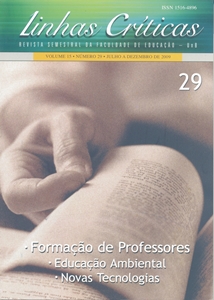Nós e os outros animais: Especismo, Veganismo e Educação Ambiental
DOI:
https://doi.org/10.26512/lc.v15i29.3532Keywords:
Relação entre animais humanos e não-humanos;, Ética;, Paradigmas educacionais;, Especismo;, Veganismo;, Educação ambientalAbstract
Neste artigo são apresentados alguns fundamentos epistemológicos para a construção de uma educação ambiental (EA) crítica, explorando as fronteiras entre EA e paradigmas nãoantropocêntricos como parte de uma reflexão transformadora da relação sociedadenatureza. Os argumentos desenvolvidos mostram que, no âmbito de uma nova perspectiva genuinamente não-antropocêntrica, devemos considerar os interesses dos animais nãohumanos não apenas por questões de ordem ética tout court ”“ ou seja, pelo seu valor intrínseco como “sujeitos de uma vida” ”“ mas também porque essa nova postura traria resultados positivos no que tange à sustentabilidade em suas diversas dimensões. Para tanto, discute-se a interface entre EA e os conceitos de especismo e veganismo ”“ ligados ao ideário do chamado “abolicionismo animal” ”“ como conceitos-chaves para a construção de uma ética ecocêntrica.
Downloads
References
ALMEIDA, Dirce G. A construção de sistemas agroflorestais a partir do saber ecológico local: o caso dos agricultores familiares que trabalham com agrofloresta em Pernambuco. 2001. 235f. Dissertação (Mestrado), Curso de Mestrado em Agroecossistemas, Universidade Federal de Santa Catarina, Florianópolis, 2001.
ARENDT, Hanna. A condição humana. 2. ed. Trad.: Roberto Raposo. Rio de Janeiro: Forense, 1983.
BRÜGGER, Paula. Amigo animal: reflexões interdisciplinares sobre educação e meio ambiente: animais, ética, dieta, saúde, paradigmas. Florianópolis: Letras Contemporâneas, 2004a.
BRÜGGER, Paula. Educação ou adestramento ambiental? 3. ed. Chapecó: Argos; Florianópolis: Letras Contemporâneas, 2004b.
BRÜGGER, Paula. Vivissecção: fé cega, faca amolada? In: MOLINARO, Carlos A.; MEDEIROS, Fernanda L. F.; SARLET, Ingo W.; FENSTERSEIFER, Tiago (Orgs.). A dignidade da vida e os direitos fundamentais para além dos humanos: uma discussão necessária. Belo Horizonte: Fórum, 2008. p. 145-174.
CAPRA, Fritjof. A teia da vida: uma nova compreensão científica dos sistemas vivos. Trad.: Newton R. Eichemberg. São Paulo: Cultrix, 1996.
CASSIRER, Ernst. Linguagem e mito. 3. ed. Trad.: J. Guinsburg e Miriam Schnaiderman. São Paulo: Perspectiva, 1992 (Coleção Debates).
CAVALIERI, Paola; SINGER, Peter (Orgs.). El proyecto gran simio: la igualdad más allá de la humanidad. Madrid: Editorial Trotta, 1998.
COWARD, Ros. Who do we think we are? The Ecologist, London, v. 32, no. 6, p. 7, July/Aug. 2002.
DALY, Herman. Boundless bull. ln: LAMAY, Craig L.; DENNIS, Everette E. (Eds.). Media and the environment. Washington: lsland Press, 1991. p. 149-155.
DAWKINS, Richard. Lagunas en la mente. In: CAVALIERI, Paola; SINGER, Peter. El proyecto gran simio: la igualdad más allá de la humanidad. Madrid: Editorial Trotta, 1998. p. 105-114.
DIAMOND, Jared. El tercer chimpancé. In: CAVALIERI, Paola; SINGER, Peter. El proyecto gran simio: la igualdad más allá de la humanidad. Madrid: Editorial Trotta, 1998. p. 115-132.
DUNBAR, Robin. Que hay en una clasificación? In: CAVALIERI, Paola; SINGER, Peter. El proyecto gran simio: la igualdad más allá de la humanidad. Madrid: Editorial Trotta, 1998. p. 141-145.
ENGEL, Cindy. Heal Thyself. The Ecologist, London, v. 32, no. 3, p. 34-38, Apr. 2002.
FANO, Alix. Beastly practice. The Ecologist, London, v. 30, no. 3, p. 24-28, May 2000.
GONÇALVES, Carlos Walter Porto. Os (des)caminhos do meio ambiente.São Paulo: Contexto, 1989.
GOODALL, Jane. Los chimpancés: llenando el vacío. In: CAVALIERI, Paola; SINGER, Peter. El proyecto gran simio: la igualdad más allá de la humanidad. Madrid: Editorial Trotta, 1998. p. 19-29.
GREEK, Ray; GREEK, Jean. Specious Science: how genetics and evolution reveal why medical research on animals harms humans. London, New York: Continuum, 2003.
LaFOLLETTE, Hugh; SHANKS, Niall. Brute Science: dilemmas of animal experimentation. London: Routledge, 1996.
MARCUSE, Herbert. A ideologia da sociedade industrial: o homem unidimensional. 6. ed. Trad.: Giasone Rebuá. Rio de Janeiro: Zahar, 1982.
MARTINEZ ALIER, Joan. De la economia ecológica al ecologismo popular.2. ed. Barcelona: Icaria, 1994.
MAZZOLLI, Marcelo; GRAIPEL, Maurício; DUNSTONE, Nigel. Mountain lion depredation in southern Brazil. Biological Conservation, London, v. 105, no. 1, p. 43-51, May 2002.
MONTEIRO, Carlos Augusto de F. Conferência de abertura. In: ENCONTRO NACIONAL DE ESTUDOS SOBRE MEIO AMBIENTE, 2, 1989, Florianópolis. Anais...Florianópolis: UFSC, 1989. v. 3, p. 3-25.
PINDYCK, Robert S.; RUBINFELD, Daniel L. Microeconomia. 5. ed. Trad.: Eleutério Prado. São Paulo: Prentice Hall, 2002.
REGAN, Tom. Defending animal rights. Chicago: University of Illinois Press, 2001.
REGAN, Tom. Jaulas vazias: encarando o desafio dos direitos animais. Trad.: Regina Rheda. Porto Alegre: Lugano, 2006.
SINGER, Peter. Ética prática. 2. ed. Trad.: Jefferson L. Camargo. São Paulo: Martins Fontes, 1998.
SINGER, Peter. Vida ética: os melhores ensaios do mais polêmico filósofo da atualidade. Trad.: Alice Xavier. Rio de Janeiro: Ediouro, 2002.
SOAR, Ercy. Representações de self entre os psicoterapeutas: ciência ou senso comum? Revista de Ciências Humanas, Florianópolis, v. 16, n. 23, p. 47-61, abr.1998.
Downloads
Published
How to Cite
Issue
Section
License
Copyright (c) 2016 Linhas Críticas

This work is licensed under a Creative Commons Attribution 4.0 International License.
Authors who publish in this journal agree to the following terms:
-Authors maintains the copyright and grants the journal the right of first publication, the work being simultaneously licensed under the Creative Commons Attribution License which allows the sharing of the work with recognition of the authorship of the work and initial publication in this journal.
- Authors are authorized to enter into additional contracts separately, for non-exclusive distribution of the version of the work published in this journal (eg publish in institutional repository or as a book chapter), with acknowledgment of authorship and initial publication in this journal.
-Authorers are allowed and encouraged to publish and distribute their work online (eg in institutional repositories or on their personal page) at any point before or during the editorial process, as this can generate productive changes as well as increase the impact and the citation of published work (See The Effect of Free Access).



